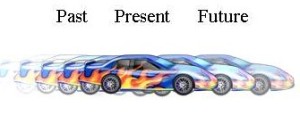 As writers we constantly deal with time, both as a concept and a reference point. We can write a whole novel about an hour in the life of a character, or we can cover billions of years in the same amount of pages. We can stretch a moment into a lifetime, go back in time, or forward; we can travel sideways (as in parallel realities) or into the depth of time (like a dream within a dream within a dream). In fact as writers we utilise and adapt every conceivable theory concerning time.
As writers we constantly deal with time, both as a concept and a reference point. We can write a whole novel about an hour in the life of a character, or we can cover billions of years in the same amount of pages. We can stretch a moment into a lifetime, go back in time, or forward; we can travel sideways (as in parallel realities) or into the depth of time (like a dream within a dream within a dream). In fact as writers we utilise and adapt every conceivable theory concerning time.
Truth is stranger than fiction
Time is relative, we are told, and just about everyone knows that; although not everyone understands it. If you ask the question, “What does ‘time being relative’ really mean?” It would of course depend on who you ask, but you are still likely to get a stock answer that may not be easy to understand. A physicist might theorise about the space-time continuum; some may even express concepts regarding the multiverse theory; whereas a philosopher might approach the subject from a totally different angle, postulating from a metaphysical or psychological standpoint. Continue reading “The Concept of Time in Writing”

 Tenses are the way verbs change to show when something happened, either in the past (“She went…”), the present (“She’s going…”) or the future (“She will go…” etc.). Most verbs have two ‘aspects’: continuous (“He was writing a book…”) and simple (“He wrote a book.”), which show whether an action was completed. Obvious enough, but the beginning writer has a number of pitfalls to avoid.
Tenses are the way verbs change to show when something happened, either in the past (“She went…”), the present (“She’s going…”) or the future (“She will go…” etc.). Most verbs have two ‘aspects’: continuous (“He was writing a book…”) and simple (“He wrote a book.”), which show whether an action was completed. Obvious enough, but the beginning writer has a number of pitfalls to avoid.